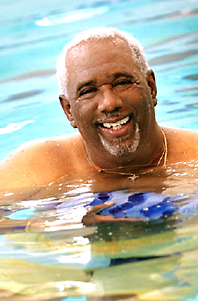Hip Replacement: John's Story
Going Strong After Hip Replacement
 John Euill has rubbed elbows with distinguished people from all over the world. The retired U.S. Capitol police officer says, "During my 34 years of service, I saw many impressive dignitaries, including the third president of Egypt, Anwar Sadat, and former president of South Africa Nelson Mandela. I also witnessed many frightening events, including riots, protests and bombings."
John Euill has rubbed elbows with distinguished people from all over the world. The retired U.S. Capitol police officer says, "During my 34 years of service, I saw many impressive dignitaries, including the third president of Egypt, Anwar Sadat, and former president of South Africa Nelson Mandela. I also witnessed many frightening events, including riots, protests and bombings."
While John has always faced the challenges of being a police officer with courage and fortitude, the idea of hip replacement surgery left him feeling a little uneasy.
"My sister-in-law had a rough time after having her hip replacement surgery seven years ago, and I chickened out the first time around," the 65-year-old says jokingly. "I had never had any type of operation or any broken bones, and I was scared."
It was during a trip to South Africa when John realized he could no longer put off the surgery. "There was a lot of walking, and I barely made it through the trip," he says. "My hip was basically bone rubbing on bone."
In talking with his Kaiser-Permanente physician, Murali Balakrishnan, MD, orthopedic surgeon, John learned his surgery would be much different than his sister-in-law's. Because of advanced surgical technology, his surgery would be less invasive - meaning a smaller incision with less blood loss and a faster recovery.
In May 2008, John had a total right hip replacement. He was discharged after only three days and proudly reports, "By mid-June, I was on my own."
John's first hip replacement went so well that when his left hip started giving him problems a few months later, he didn't hesitate to have it replaced too.
"That surgery was in January 2009, and I've had no problems since then," he says. "If I had known hip replacement surgery was going to be this easy, I would have done it sooner."
Experience Counts
The Joint Center at Holy Cross Hospital features a specially trained, multidisciplinary team of physicians, nurses and therapists.
"Physicians at Holy Cross Hospital perform thousands of orthopedic procedures each year, including hundreds of joint replacement surgeries," says Antoni B. Goral, MD, medical director, Joint Center.
The center's specialized program offers a continuum of care and support throughout the joint replacement process.
"Everything I needed was right there and set up just the way you'd want it," John says. "The physicians, nurses and physical therapists were very professional in their work and very accommodating."
A Coach's Encouragement
Patients at the Joint Center are part of an intensive program built upon a series of milestones and achievement dates specific to each patient.
From day one, patients are encouraged to facilitate their own healing by walking and moving about. In fact, patients are required to select a family member or friend who will act as a personal coach. The coaching system helps to ensure that patients are doing their exercises regularly, both in the hospital and at home.
John's coach was his wife of 23 years, Awilda. "I made sure he did all the exercises he was supposed to do and sometimes more," Awilda says. "But I also made sure he didn't overdo it."
After each surgery, a physical therapist from Holy Cross Home Care visited John twice a week for four weeks at his home. Awilda is thrilled with John's progress but also a little perplexed.
"I'm still scratching my head," she says. "John had two surgeries in 10 months and is going about his business like nothing ever happened."
Preparing for Joint Replacement
To help patients know what to expect before, during and after surgery, Holy Cross Hospital offers a special two-hour educational session every other week. In addition to receiving practical information, patients tour the facility and meet some of the staff members who may be involved in their post-surgical care. Patients are encouraged to bring a family member, friend or other designated recovery coach to the session.
